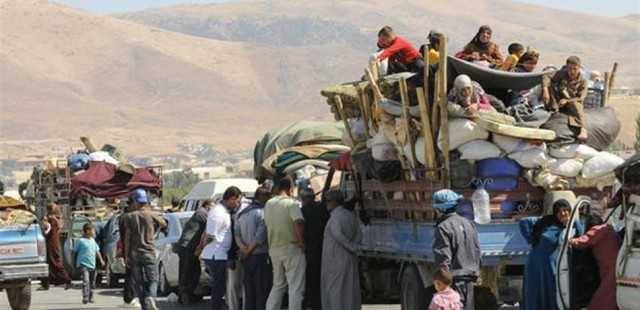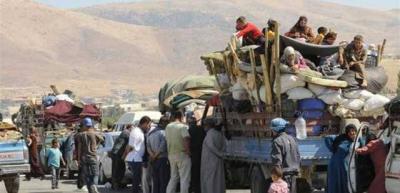The challenges facing Lebanon have become large and complex, ranging from the stalled presidential election to economic, social, and financial crises, to the most pressing issue concerning security which is now threatened by developments in the Palestinian refugee camp in Ain al-Hilweh, along with a new influx of Syrians into Lebanon. According to "Al-Diyar," the second wave of Syrian displacement to Lebanon, coinciding with the turmoil in Ain al-Hilweh, has unsettled the Lebanese situation with a sudden influx of Syrians through illegal crossings. The latest wave of displaced persons raises suspicions and questions: Why are they arriving now? Who is behind their exit from their country? Are there realmente economic motivations? Where is the state? And why is there official governmental inertia and avoidance of responsibility?
These same questions surfaced at the consultative ministerial meeting in the office of caretaker Prime Minister Najib Mikati, after the session’s quorum was lost due to the absence of ministers. It also became evident that a significant number of officials are acting with negligence and irresponsibility, even though most are aware that the issue of displacement threatens to lead Lebanon to a breaking point. The absence of ministers from an urgent session to address the catastrophic crisis cannot be justified except by narrow political calculations that do not serve Lebanon’s interests, while the caretaker government has delayed putting a contingency plan in place for the crisis. Furthermore, the decisions made by it, according to political observers, are simply reiterations of previous decisions that remain unimplemented.
The political authority, according to monitoring political sources, continues to handle the most dangerous file Lebanon has faced since the outbreak of the Syrian war in 2011 in a casual manner, which suggests the existence of a conspiracy, backed by external forces, to keep the displaced in Lebanon and integrate them. This is reflected in the complicity of the international community, which provides displaced persons with aid and funding, encouraging those who remain in Syria to leave for financial benefits, especially since Syria is suffering from a severe economic crisis.
The complete data and details related to the second wave of displacement were discussed in the last government meeting, where Army Commander General Joseph Aoun briefed the caretaker Prime Minister and officials on the current situation and the data available to the military, describing the displacement as very dangerous, posing a threat to Lebanon's identity and signaling potential security repercussions.
The second displacement "concerns" the authorities, the sources add, as the army fulfills its duties within its responsibilities and capabilities, amidst fears that the situation may worsen and spiral out of control in light of political inactivity. The army is monitoring internal security files, remains prepared around Ain al-Hilweh in anticipation of the worst, and continues its tasks. However, the displacement issue requires special handling because the army faces difficulties in controlling illegal crossings and combating smugglers who have gained skills in smuggling Syrians through rugged routes, in addition to facing land smuggling via the northern and eastern borders as well as maritime smuggling by the “boats of death” carrying fleeing Syrians and Palestinians along with some Lebanese escaping from the crises.
"Al-Diyar" points out that the available information with security agencies indicates that the latest displacement is linked to specific agendas, especially since 90% of those entering Lebanese territory are young individuals trained in handling weapons, which negates economic displacement theories and raises significant concerns, opening the door to a very dangerous reality being prepared coinciding with the security explosion in Ain al-Hilweh.
According to the sources, the Syrian displacement crisis to Lebanon has become a ticking time bomb that may explode soon, due to the state's withdrawal from organizing the matter and resorting to ineffective decisions that do not tackle the problem at its root. Although the security forces are exerting their utmost efforts, their work alone is insufficient. The army lacks sufficient personnel to cover the entire border and halt the smuggling of Syrians, and there is still no political cover to address the issue on the ground. The work of the agencies involves apprehending smugglers, detaining illegal displaced persons, and returning them to their countries to limit their influx, yet these measures alone are not enough.




